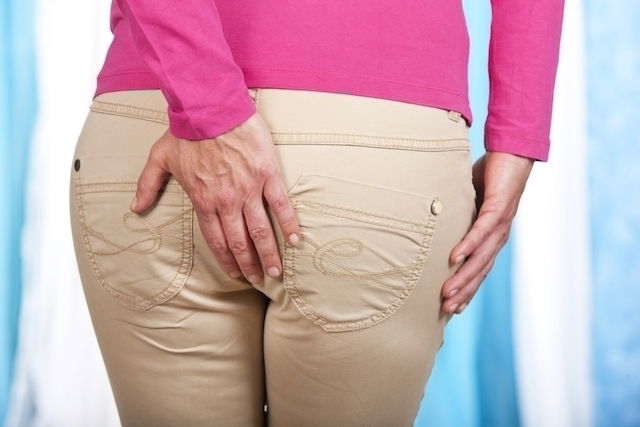Hemorrhoids are commonly caused by straining with bowel movements from constipation or diarrhea. Changes in stool form and consistency can encourage more straining and effort when trying to evacuate, which can lead to hemorrhoids developing and becoming palpable and painful.
Hemorrhoids can also be caused by obesity, pregnancy, weight lifting, or prolonged periods of standing or sitting. These reasons are related to excess pressure being put on the anus and rectum, leading to swelling in the veins in the area.
Hemorrhoids typically resolve on their own without any treatment. However, if they cause intense pain and itching, discomfort with sitting or standing, or start to bleed, you should see your doctor for assessment.

Why do I have hemorrhoids?
The main causes of internal and external hemorrhoids include:
1. Chronic diarrhea
Chronic diarrhea is characterized by frequent, soft or liquid bowel movements that lasts for over 4 weeks. Chronic diarrhea can cause hemorrhoids due to the inflammation that the stool causes on the anal mucosa.
What to do: Regulating the frequency of bowel movements will help to prevent or treat hemorrhoids. Frequent diarrhea should be assessed to determine the underlying cause. Most of the time, chronic diarrhea is caused by irritable bowel syndrome (IBS), which needs appropriate treatment in order to avoid complications. Learn about ways you can treat diarrhea.
2. Obesity
Hemorrhoids are often a consequence of excessive weight. In addition, the habits of the person who is overweight such as sedentarism, and a fat-rich diet usually lead to an overall decrease in bowel movements, causing constipation and difficulty passing stool.
What to do: You should work toward an ideal weight that is healthy for you. To do so, you will need to make changes to your diet and start exercising regularly. Ideally, you should consult a registered dietitian, as well as an endocrinologist to assess whether there are any health condition contributing to obesity. Use our calculator to determine your ideal weight.
3. Avoiding pooping when the urge comes
Not passing stool when you feel the need to can cause the feces to get dry and hard, causing abdominal discomfort and consequently difficulty evacuating. This can increase your risk for hemorrhoids.
What to do: You should not hold in your poop when you have the urge to have a bowel movement. Make sure you take time to poop in a calm, quiet bathroom whenever possible.
Also recommended: Hemorrhoid Self-Care: 7 Tips for Pain Relief tuasaude.com/en/hemorrhoid-treatment4. Sitting on the toilet for too long
Sitting on the toilet for too long can be a sign of excessive straining and constipation, which can lead to hemorrhoids.
Sitting for long stretches of time on the toilet additionally puts pressure on the anus and rectum, which can also favor the development of hemorrhoids.
What to do: You should limit your toilet use to 10 minutes, and avoid taking your phone or other activities with you to the bathroom if you tend to go over this time. If you frequently experience constipation or feel that the need to strain to evacuate is leading to prolonged toilet time, you should speak to your doctor about identifying the underlying cause.
4. Weight lifting
Lifting heavy weights in the gym, or looking after older adults who need to be lifted frequently, can lead to an increase in pressure in the veins of the anal region, causing hemorrhoids.
What to do: Ensure your are involving proper body mechanics when lifting heavy weights. You should try to contract your core and perianal muscles when exerting force.
5. Pregnancy
It’s normal to have hemorrhoids during pregnancy as they are a common finding. They normally happen due to the increases in body weight, increases in overall pressure on the pelvic area, and constipation, which are physiological changes that are expected to happen during pregnancy.
Read more about hemorrhoids during pregnancy and how they can present.
What to do: You can prevent the occurrence of hemorrhoids by ensuring regular light exercises, such as walking, and adequate fluid intake throughout the day. Diarrhea is also a common occurrence during pregnancy - read about safe ways to treat diarrhea naturally when pregnant.
6. Low fiber diet
Fiber is very important for adequate functioning of the body, and it is responsible for regulating the bowels. Low fiber intake can lead to less frequent bowel movements as well as dry, hard feces, which results in pain when passing stool.
What to do: Ensure you are including fiber-rich foods in your diet, like whole grains, leafy greens, and fruit with peel. See a list of high fiber foods. It is important to consume fiber with plenty of water.
7. Prolonged standing
People with professions that require prolonged standing can lead to decreased blood circulation. This increases pressure on the blood vessels around the anal region, increasing your risk for hemorrhoids.
What to do: You can prevent hemorrhoids by taking time to stretch every 2 hours. Make sure you incorporate pelvic floor exercises in your daily routine, and to contract your perineum or perform Kegel exercises when standing. Regular exercise is also important for ensuring good circulation.
8. Age
Even though hemorrhoids can appear at any age, they are more frequent in people over 45 years old. With normal aging, it is common for supportive tissues of the rectal vessels to weaken and stretch.
Also, people with a past history of hemorrhoids are prone to re-develop them in the future.
What to do: As above, you should incorporate regular exercise into your week to preserve the integrity and strength of muscle and skin tissue.
9. Spicy or saucy foods
Food that is very spicy or saucy can lead to anal inflammation and hemorrhoids. This can also happen with excessive alcohol intake.
What to do: You should try to limit your intake of spicy and saucy foods, and avoid these foods altogether when you are experiencing a hemorrhoid flare-up.






























